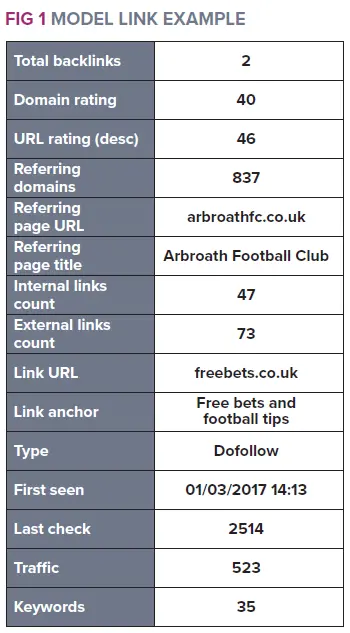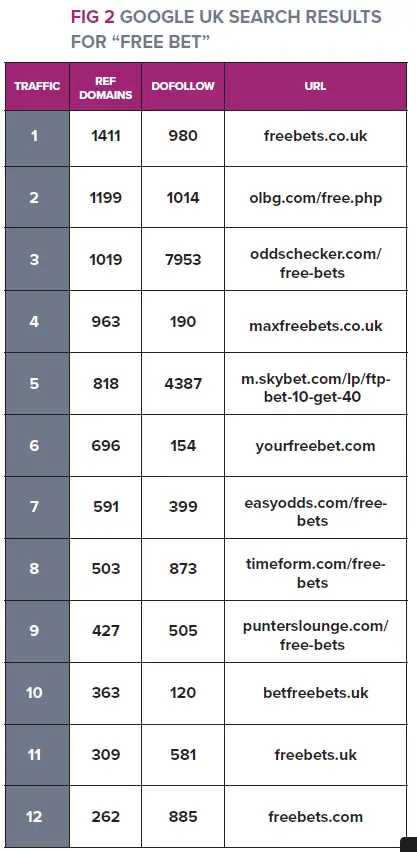

CASH ON LINKS! There is a right time for placing links but it’s high time to get off the link train as it’s bad for your financial health, writes Nick Garner.
This issue, I want to talk about links and how you’re probably burning your cash on them. And I want to offer you some alternatives for how you could spend your money.
I’ve been around SEO for quite a while and consequently get asked for links a lot. When an affiliate or operator comes to me asking for links, it means they’ve got budget to spend on getting ranked. Question is: what’s the best way to rank for your money? My answer? Not necessarily links. And this is why...
PSYCHOLOGY: SELECTIVE ATTENTION
You’ve got a website. Your site once ranked and you want it to rank again. You’ve done all the indexation work, created your listings and now you’re hunting out links.
You notice how links always seem to correlate with ranking better. Thus, the argument for getting as many links as possible seems very strong. That’s called selective attention.
There are numerous studies on the correlation between links and rankings. As a general rule you could say there’s a 25-30% correlation between rankings and volume of links.
But that also means that 70-75% of the time, links do not correlate with rankings. So how would you react if somebody said to you: “Spend most of your marketing money on links and there’s a 70% chance it won’t work”? Would you spend all your cash on links?
WHAT IS THE PENGUIN ALGORITHM?
There’s a lot of confusion over what the Penguin algorithm actually is. In a nutshell, it’s an algorithm used by Google to evaluate link quality. Some might say it’s a trust algorithm – i.e. a link is either trusted or it’s not. A better way to look at Penguin is as a ‘link ranking algorithm’. In other words, links have a ranking based on an algorithm and if the ranking is too low, the link isn’t accounted for.
The rank is based on the number of links a ‘link donor’ page is from trusted seed pages. So if your junk link donor page has no trusted links going into it, it’s a valueless link. Roger Montti wrote a well-researched piece on the topic, which can be found online.
FEEDING THE BEAST
In the past we fed Penguin huge volumes of seed data in the form of disavow reports. We told Google exactly which sites we thought were toxic and it the used information to structure the Penguin algorithm/link graph that we know today.
Google is so confident in the Penguin algorithm, it just zeroes out the value of junk links. The company knows you’ll eventually stop burning your cash when you see no return on your link spend.
Of course, you could go on a junk link binge and somewhere among those millions of auto-generated links could be little nuggets of gold. If you’re not worried about being flagged up for a manual penalty, then link spam away!

WHAT MAKES A GOOD LINK?
I’ve spent years asking myself this question. First, remember that 70% of the time links don’t correlate with rankings. Second, there’s no easy answer to “this link got me that ranking” because ranking sites generally have lots of linking domains. Since the cause and effect is so fuzzy, how do you know which link drove your rankings?
My view? Use a proxy metric to describe a ‘good’ link donor page:
- Google search traffic, because Google trusts that web page enough to rank it.
- Majestic Trust rank, which seems to be modelled around the Penguin algorithm.
- Ahrefs UR (URL rating) and DR (domain rating). Both these metrics seem to correlate fairly well with rankings.
- And of course the overused Moz DA metric
I’d like to think Google rankings are a great proxy for trust, but statistically that’s not the case. The reality is that the Penguin algorithm appears to not be quality driven. You just need a reliable metric to indicate distance from a trusted seed site. The best metrics I know of are either Majestic Trust Flow or Ahrefs UR/DR. I’m also very reassured when I see some search visibility from a link donor page.
Fig 1 on the left shows an example of a nice link. As a rule, you can say with some certainty that wherever the crowd goes, the links will be more expensive. Let’s assume traffic metrics aren’t part of the Penguin algorithm. You can look for value by buying links with a lesser-used metric, such as Ahrefs UR/DR.
IS THERE A BEST TIME TO DROP A LINK?
Yes. I think there is a right time for placing links. You’ll remember I talked about selective attention at the beginning of the article; well, having looked at a huge number of link/ranking graphs, there are repeated patterns.
For the ranking winners, I see correlations between link acquisition and rankings. For the losers I see a miscorrelation between link acquisition and rankings.
Remember I said that about 70% of the time links do not correlate with rankings. The pattern I’ve noticed, and it’s a massive simplification, is:
- New domain gets launched
- Link acquisition begins
- Domain ranks
- Domain loses rankings
- Link acquisition goes into overdrive
- Domain doesn’t rank
My best analogy: there is a ‘switch’ for passing page rank to a domain. If Google trusts you, that page rank ‘switch’ stays on and your links will work. Conversely, if Google doesn’t trust you, you can get as many good links as you like but it won’t shift your rankings. I know. I’ve tried on a few projects.
WHEN IS THE ‘SWITCH’ ON?
From what I see there are generally two scenarios where the page rank ‘switch’ is on. These are:
- A new domain and/or webpage that has no trust footprint. Google gives the domain a chance to rank if it has a sufficient number of ‘good’ links and the indexation is okay.
- An existing domain and/or webpage which has positive user signal data associated with it.
USER SIGNALS AND SEARCH INTENT
Searchmetrics, the German SEO platform provider, has done some comprehensive analysis on correlations between different known ranking factors and rankings.
The highest correlating ranking factor it saw was click-through rate relative to search position. It seems obvious, but the pages that had a higher than expected click-through rate will rank higher. Crazy, I know!
The company has also built a useful tool that enables users to algorithmically identify content that matches search intent (searchmetrics.com/content). The bottom line is, what ranks best is most satisfying to the user. And with that in mind, the key question is: how do I get more satisfying? Well, you can begin by reading Google’s quality rater guidelines (available online), a training manual for teaching Google employees how to accurately rate the quality of a website. Once you’ve done that, start thinking in a different way about search results.

EVERY SEARCH QUERY IS A QUESTION.
Every search query leads to a set of webpages. You can think of these as answers to questions. Assuming sufficient traffic, Google will give you the best results at the top of the search page.
Let’s take a classic ‘question’, in this case “free bets”. What’s the search intent? There’s no ambiguity here. Clearly, it’s “I want free bets because I want to try a different bookmaker.”
Now let’s examine what’s satisfying for that individual:
- A list of free bets that are relevant based on the country he or she is in.
- The best offers in the market.
- Perhaps that the free bets have real user reviews.
- A clear, easy to understand layout and with quick page rendering.
- Mobile-friendly, of course.
THOUGHT EXPERIMENT
Imagine you’re a punter and you want a free bet. If you place yourself in that punter’s shoes, what would they want from you? And if you look at Google UK search results for ‘free bet’, do those results deserve to be in their ranking position? Bear in mind, ranking position and referring domains don’t correlate 63% of the time.
Why does maxfreebets.co.uk rank with so few referring domains? And why is Skybet ranking a mobile page in such a competitive search query? Answer: the pages that rank best generally satisfy users the most.
Granted, links are a factor about a third of the time. But other factors include:
- Brand awareness. People like what they’re familiar with. That might explain why OLBG, oddschecker.com and Skybet rank so well.
- Relevance to the UK. If you exclude the big brand sites, all the other top ranking sites are either UK domains or specify ‘UK’ in their title tags – an important factor in google.co.uk searches.
- Higher ranking description tags list things such as “Free bets for June 2019 – 100s of offers up for grabs”.
- Lower ranking description and title tags make vague claims, such as “free bets from the top online bookmakers”.
- Higher ranking results have clearer listings and better UX, with bigger selections of bookmaker bonuses.
There’s no single reason why one site ranks higher than another, but if you put on your punter’s hat and search for ‘free bets’ you’ll see a significant satisfaction difference between the top five search results and the bottom five.
Last year a very successful affiliate (I swore I wouldn’t reveal their identity) did a major upgrade of their site. They addressed various things, including page speed, crawl budgeting, site design and UX. Ranking improvements were the driver, but this wasn’t an exercise in traditional SEO. The primary goal was to improve relevance and user experience. There was even a big link cull.
Almost immediately after the changes were made, rankings shot up by about 100%. And this is a powerful website that had had static rankings for years before. My point? Don’t just burn cash on links. Work on user satisfaction too.
FINALLY
You want to save money? Easy.
- Start by sorting out your website experience.
- Next, if you really want to, go and get some links (not usually necessary)
- Do both of the above and you should see an upward rise in rankings.
And if you don’t see that big move in rankings, then maybe you’re missing something. That’s when you should go and ask a knowledgeable friend who can look at your site objectively.
Remember, the more satisfying your site, generally the higher you will rank. And do your best to get off the ‘link train’... it’s bad for your financial health.